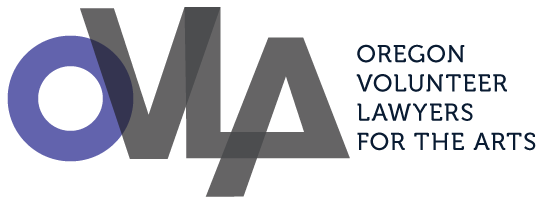Writing Requirements for Copyright Transfers
By default, the creator of an original work owns the copyright upon creation. And under Section 204 of the Copyright Act a transfer of copyright ownership is not valid unless it’s in writing.
OVLA attorney Sean Clancy explains the critical writing requirement for copyright transfers in this linked article.
Read More
Copyright Trolling
Like the trolls in folklore, copyright trolls seek tolls from all who pass by. Copyright trolls are an unfortunate byproduct of the Copyright Act; the Act creates an opportunity for a business model that does not fit within the purpose of the Copyright Act.
Read More
PSU x OVLA: Protect Your Work
OVLA joined PSU’s Student Legal Services to provide the 3-part webinar series “Protect Your Work”
Read More
Black Lives Matter
OVLA believes that Black lives matter. We mourn and are outraged at the murders of George Floyd, Ahmaud Arbery, Breonna Taylor, and countless other Black Americans who have been murdered or harmed by systemic racism and brutal law enforcement practices. We stand in solidarity with the Black community and those exercising their constitutional right to protest against racial injustice.
Read More
OVLA's Response to Covid-19
OVLA is committed to safely continuing its mission during this time. To do so, we are temporarily taking the several steps.
Read More
Client Spotlight: Rachel Miller-Howard
Art by Doxx Magazine contributor, Molly Mendoza.
Read More
You + Me = Us: A Talk About Collaboration
Join us on April 18, from 4-5pm, for a Design Week Portland panel discussion about artistic collaboration and related legal considerations.
Read More
Copyrights for Music, Part II: What the Music Copyrights Mean to the Owners
This week, our exploration of the topic of music copyright continues as we discuss what the music copyrights mean to the owners.
Read More
Copyrights for Music, Part I
Today’s post will cover some important fundamentals of music copyrights. Unlike most creative works, which are generally protected by a single, over-arching copyright, recorded music is covered by two copyrights: one for the composition, and one for the sound recording. Understanding how the two copyrights differ, and how they interplay with each other, is important to understand the music industry and the protections that music copyright owners enjoy.
Read More
How Much ‘Minimis’ is de Minimis?
A copyright grants protection to the owner against any work which is “substantially similar” to the copyrighted work. This includes not only copying, but recreations of a copyrighted work as well. For instance, if you were to replicate the exact setting and elements of a particular photograph and recreate the picture using your own camera, you may be infringing on that photograph, even if you aren’t making an actual copy of the original. This is a powerful protection given to copyright owners, but it isn’t limitless. One of the limitations to this protection is known as the de minimis doctrine—literally, copying of such a trifling amount that the law need not be concerned. This week, we’ll cover what the de minimis doctrine is and when it may apply.
Read More
Online Content Sharing, Part III: Is It Working?
The Digital Millennium Copyright Act (DMCA), in particular the section 512 safe harbor provision, fundamentally changed how content is shared on the internet. As we discussed in Part I, the safe harbor attempts to incentivize service providers places where content can freely be shared online without destroying the copyright holder’s hopes of protecting his intellectual property. The takedown notice and counter-notice procedures we discussed in Part II attempt to provide an effective but balanced way to enforce copyright protections online without subjecting the process to abuse. This week, we’ll address the question: is it actually working?
Read More
Online Content Sharing, Part II: Takedown Notices
As we noted in Part I of this series, one of the challenges for copyright owners who find their material posted online is finding the individuals who posted it. To combat this problem, the safe harbor provision requires service providers to have a system in place by which copyright owners can request that allegedly infringing material be taken down. It is up to service providers to determine the best way to accept such notices, bearing in mind that removal of content must be sufficiently expeditious.
Read More
Online Content Sharing, Part I: Safe Harbor
According to an annual study by Cisco, within three years, 85 percent of American internet consumption will be watching video, nearly all of which is protected by copyright. While most online video is licensed from the copyright holders, some of the most popular websites online are not content creators or licensees, but “online service providers” like YouTube, which allow users to post their own material and share with the world.
Read More
